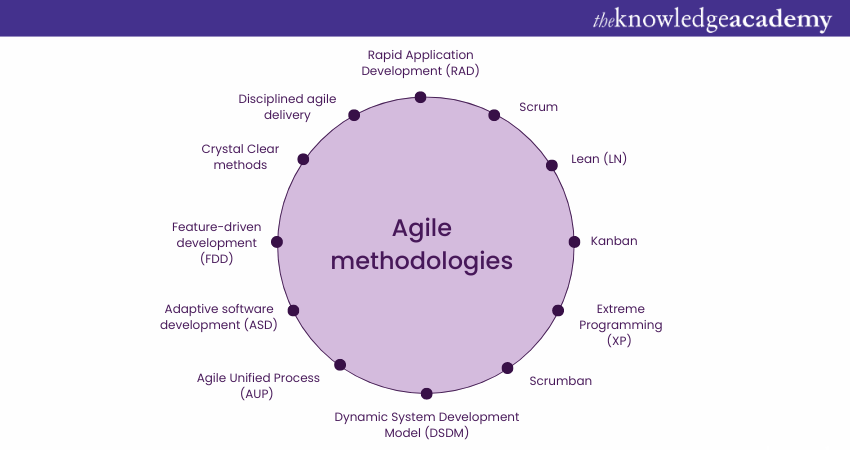We may not have the course you’re looking for. If you enquire or give us a call on 800600725 and speak to our training experts, we may still be able to help with your training requirements.
Training Outcomes Within Your Budget!
We ensure quality, budget-alignment, and timely delivery by our expert instructors.

The world is embracing Agility and its collaboration for software and product development. The adaptation of Agile accelerates software delivery, manages uncertain situations, increases productivity and enhances business and software quality. The main reason to adopt Agile is for its early risk reduction feature. The risk management in Agile is evaluated at each sprint. In short, businesses prefer Agile to seek efficiency in a better, faster and cost-effective manner. After Agile adoption, the enterprises reported an average of 60% growth in revenue margin.
In this blog, we’ll discuss how Agile adoption will boost Project Management.
Table of Contents
1) Objections to Agile Adoption
2) Agile Enhances Project Management
3) Conclusion
Objections to Agile Adoption
Despite Agile being a successful methodology, adopting Agile still faces some objections from people's end. Let’s discuss the two main objections below.
People Resistance
In Agile adoption, people need to come out of their comfort zone and understand their roles in this modern culture. Unlike traditional Project Management, there is no hierarchy or top-down approach. No longer like a closed culture where everyone is responsible for their work. Agile requires a lot more openness and democratic action in the system. People may be reluctant to this adoption as it makes them accountable for their roles.
Learn the foundations of Agile with our Agile Project Management Foundation course. Register now!
Agile - does not fit all
There can be specific projects where you can feel that Agile is not a best-fit approach. It can be in terms of businesses, clients or the processes you follow. Before ensuring Agile for the project, provide your project with a solution to the questions below.
a) What kind of industry does our project is focused on?
b) What business arrangements support the project?
c) Do our customer service and engagement levels seem to be at a high level?
d) What is the purpose of the project?
e) What are the demands of the client and the business?
f) What is the business goal that we are seeking?
g) What are the principles of our business architecture in terms of software development?
h) Do we "create/ buy"?
i) How developed is our business operating model?
No one size fits all solution. Always ensure the method you practice is the right one to drive the project to success. You have many more methodologies to adopt if you feel it’s a no.

Agile Enhances Project Management
Agile methodology in Project Management has enhanced organisations with high-accuracy software products, and it saves time and money. Agile brings in a new formula for Project Management with numerous benefits.
Agile Culture Focuses more on
a) Communication
b) Teamwork
c) Collaboration
d) Innovation
e) Rapid decision-making
f) Supporting Clients
These are the key components of Agile success. A collaborative effort is required in an Agile team to promote diverse conversation. Thus, enabling the team members to learn others’ viewpoints and share ideas. Openness and transparency will build trust and support among the teams. Agile gives an upper hand to collaboration because everyone on the team will be aware of their role within the company and how they contribute, which can help to empower, etc.
To accomplish a goal, you need to think beyond the box. Agile helps you with innovative and critical thinking to understand and fix the problem. Agile is so spontaneous as it enables you to take decisions in response to an ongoing stream of information and updates. Say your company is facing a turbulent market that is shifting continuously, then this feature of Agile would help you with decision-making.
Combining Agile Methodologies
Agile methodology can be combined with other practices to provide hybrid solutions. This indeed increases the success rate of the project and help in overcoming challenges in agile projects. Example: The Scrumban method makes use of Scrum and Kanban. Scrumban is an Agile management method. Scrum is an Agile methodology used to facilitate Project Management, and the Kanban method focuses on seeking continuous improvements.
Here we have listed out some of the popular methodologies.
a) Scrum
b) Lean (LN)
c) Kanban
d) Extreme Programming (XP)
e) Scrumban
f) Dynamic System Development Model (DSDM)
g) Agile Unified Process (AUP)
h) Adaptive software development (ASD)
i) Feature-driven development (FDD)
j) Crystal Clear methods
k) Disciplined agile delivery
l) Rapid Application Development (RAD)

Working on these methods would help you with faster product delivery and enhances Project Management.
Become a pro in Scrum Master techniques with our Scrum Master Certification course. Enrol now!
Agile Tools
If you're a Project Manager, you'll use the necessary tools to assist and regulate the workflow. Tools help you with time and task management between businesses. With Agile Project Management Tools, teams can finish a task quickly without compromising on quality. If you are into Agile culture, then knowing the right tool would make your work more accessible than before. Below are a few Agile tools widely used in Project Management.
a) ClickUp: This one app to take their place all. Tasks, documents, chat, goals, and more are organised in one location.
b) Teamwork: This app facilitates automation for visual projects. You can track your team’s growth through Teamwork.
c) ActiveTrak: ActiveTrak helps you in discovering the applications and websites that increase your productivity. It also enables you to communicate product information to your team.
Ready to lead? Embrace the role of Project Manager and drive success! Start now.
Agile Certifications
For budding Project Managers who want to take the first step in the Agile world, you need to proceed with a learning process and certification to enhance your skills. This would make you understand Agile methods briefly, and you can soon grow your career. Let me list a few certifications in Agile Project Management to help with your learning.
1) Agile Project Management Foundation and Practitioner
2) PRINCE2 Agile Foundation And Practitioner
3) Managing Agile Projects With Scrum
This is not limited. Agile has a broad scope and certifications offered globally. Sure, gaining a certificate in Agile can help you with the wisest path forward.
Conclusion
With this information, you’ll now better understand how adopting Agile will boost Project Management. To learn more about Agile Project Management, check out our wide range of courses in Agile Training offered by The Knowledge Academy. Good Luck!
Enhance your skillset and gain a certificate in Agile Project Management with our Certified Professional In Agile Project Management course. Sign-in Today!
Frequently Asked Questions
Upcoming Project Management Resources Batches & Dates
Date
 Agile Project Management Foundation & Practitioner (AgilePM®)
Agile Project Management Foundation & Practitioner (AgilePM®)
Thu 1st Jan 1970







 Top Rated Course
Top Rated Course


 If you wish to make any changes to your course, please
If you wish to make any changes to your course, please


